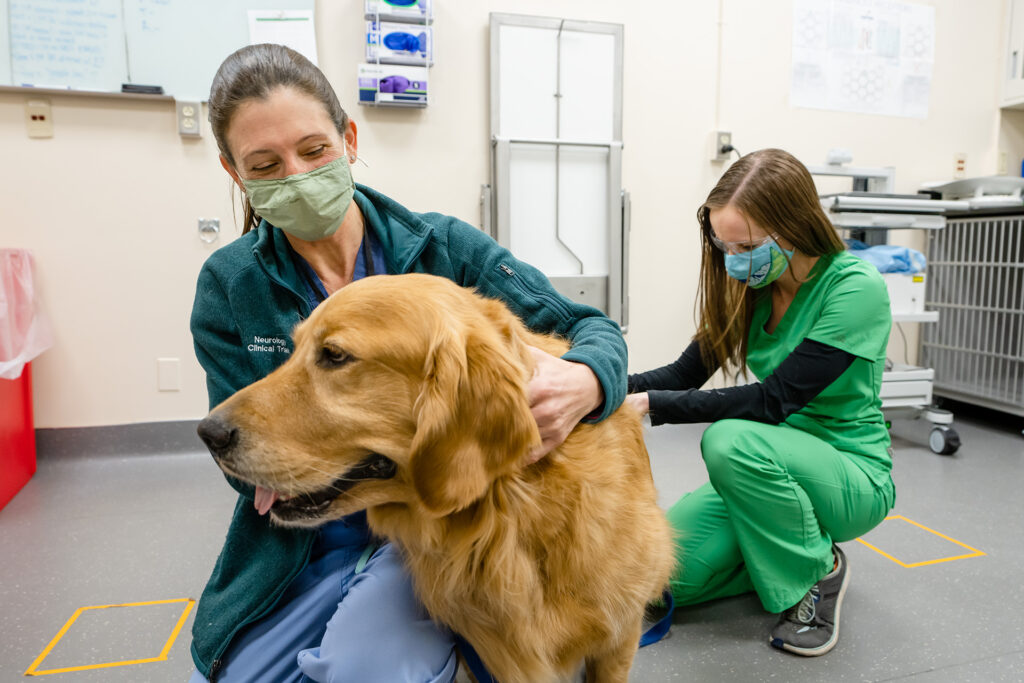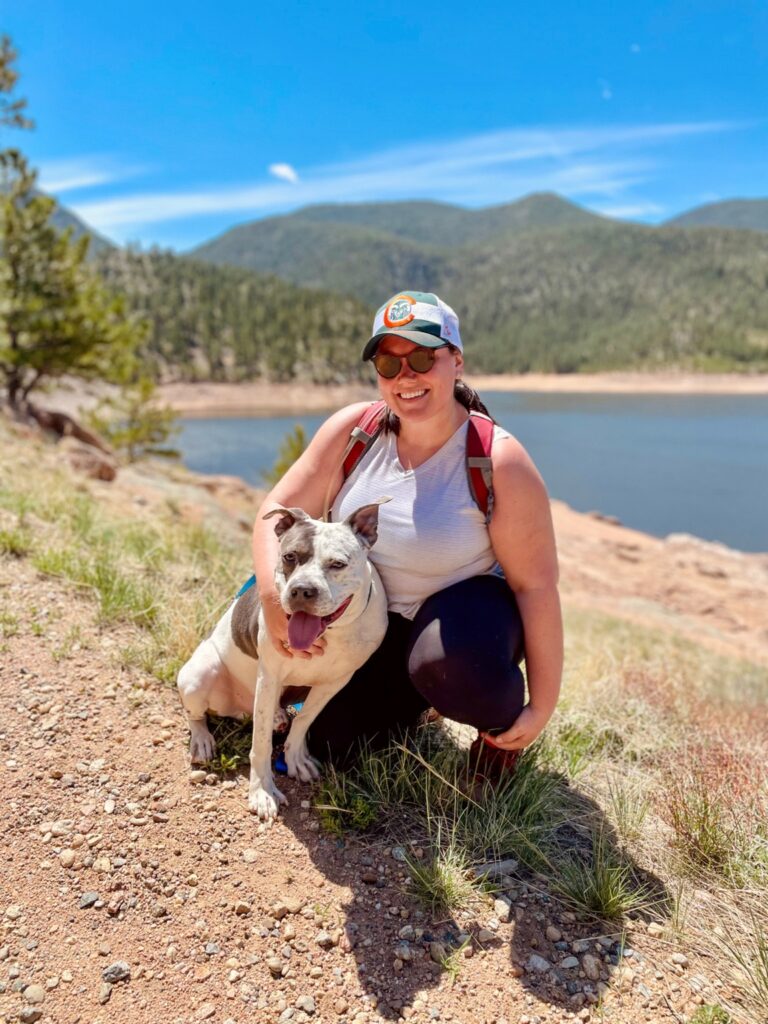by Brooke Zarecki, CHA Student Ambassador
Advancements in modern medicine have allowed both humans and canines to live longer. However, a longer lifespan has led to a greater percentage of dogs suffering from cognitive decline. This creates an urgency to find treatments and has led CSU researchers in veterinary medicine to design experiments aimed at reducing the progression of cognitive dysfunction in dogs.
Canine cognitive dysfunction is the dog equivalent to dementias, like Alzheimer’s disease, in humans. By understanding how dementia progresses in dogs, researchers can learn more about effective treatments and diagnostic tools to advance canine health, which could eventually be translated to treat humans experiencing dementia.
Breonna Kusick, coordinator for the Veterinary Teaching Hospital’s Neurology Clinical Trials team, recently shared two ongoing trials that are in need of canine volunteers.

TRAC Study: Investigating the effect of Trazodone, Rapamycin, and Cannabidiol on cognitive dysfunction in dogs
Currently, there are no approved treatment methods for cognitive decline in either humans or dogs. The TRAC study, led by Dr. Stephanie McGrath and Julie Moreno, Ph.D., tests the potential therapeutic effects of trazodone, rapamycin, and cannabidiol (CBD). These therapeutics have shown beneficial effects on brain aging in preliminary studies, which means they may be effective therapeutic options for dogs, too.
- Who can participate? The TRAC study is looking for dogs that are eight years or older, greater than 22 lbs., have signs of doggie dementia, and are otherwise healthy.
- Financial incentives: Monetary compensation in the form of a credit to your Veterinary Teaching Hospital account up to $1,000.
- What is involved? The study begins with an initial diagnostic assessment consisting of a thorough exam, bloodwork, x-rays, ultrasound, brain MRI, and a spinal tap. All participants will go home with a liquid medication to be given twice daily and a pill to be given once weekly. This is a blinded study, which means you won’t know which medication (or placebo) your dog is receiving. Some dogs will be randomly assigned to wear an activity-tracking monitor, which makes it important that your dog is comfortable wearing a collar at all times. Furthermore, it is important to bring your dog to the Veterinary Teaching Hospital every three months and allow your pet to undergo anesthesia every six months throughout the trial.
BioRAD: Biomarker Research in Aging Dogs: A longitudinal study in dogs of all ages
The BioRAD study aims to learn about the aging process in dogs, particularly differences in brain changes between older dogs compared to younger dogs. The study does this through the examination of blood, spinal fluid and imaging (MRI) of the brain, in addition to behavioral assessments.
- Who can participate? The BioRAD study is looking for healthy dogs over the age of one year, with the goal of enrollment for the duration of your dog’s lifetime or as long as you are willing to participate.
- Financial incentives: Free blood panel twice per year along with an annual $500 credit applied directly to your dog’s Veterinary Teaching Hospital account.
- What is involved? To understand more about your dog’s environment and health, yearly surveys will be performed, and your dog will be required to return every six months during the study. All appointments will consist of an exam, surveys, bloodwork, and a series of treat-finding tasks used for cognitive testing. In addition, a brain MRI and spinal tap will be performed annually.
The biochemical assay will analyze blood and spinal fluid samples to test the ability of the assay to detect markers of dementia. The MRI will be used to rule out structural brain disease and identify early changes associated with dementia. Finally, the behavioral tests will help determine the cognitive function of each patient and could help researchers determine if these tests can differentiate dogs with and without dementia. By participating in this study with your pet, researchers can study brain aging and dementia in dogs, potentially translating to identifying early signs of dementia in humans.
Pet safety
Many pet owners may hesitate at the thought of subjecting their furry companions to spinal taps or anesthesia. While Kusick agrees that there are always risks associated with anesthesia, she emphasized that these procedures are routine, and her team takes care to make the experience as safe as possible for canine participants.
“We perform an examination and full bloodwork panel prior to running anesthesia to ensure everything looks as safe as can be. If we find anything on the pet’s exam or bloodwork that indicates they cannot undergo anesthesia, we will not proceed with the study in the interest of the pet’s safety,” Kusick said.
At the Veterinary Teaching Hospital, spinal taps in dogs are performed almost daily. The procedure uses a very small needle to draw spinal fluid, which is an important biospecimen in studying brain aging. Other than a small spot on the back of the neck where the fur is clipped, there should be no lasting effects from the spinal tap.
Testimonial
Hannah Halusker, a CSU employee whose dog is enrolled in the BioRAD study, reaffirms the safety of the procedures.

“My dog, Tucker, has been a participant in BioRAD for two years now, and I too had reservations about the invasiveness of the procedures when he was first enrolled in 2022. But, the clinical trials staff spent a lot of time and discussed the study in detail with me, so I felt like I had all the information I needed to consent for his participation, especially after I realized just how routine the bloodwork and spinal taps are in veterinary care.”
As for Tucker’s demeanor at his BioRAD visits, Halusker says he loves the experience and is always happy to see his doctors at the Veterinary Teaching Hospital.
“While Tucker may be extra tired when he comes home after his annual spinal tap, he’s back to his normal self by the next morning.”
She adds that the accessibility of the clinical trials staff via phone and email also helps to alleviate any worries around BioRAD visits.
“As a dog owner, I appreciate the financial incentive of Tucker’s participation, as the $500 credit covers most of Tucker’s primary care at the VTH each year,” Halusker said. “I’m also a science enthusiast, so I enjoy knowing that Tucker is contributing to future medical advancements with his participation.”
Interested in helping further this research?
Please contact Breonna Kusick or Bridgit Patten, clinical trials research associate, at csuneurotrials@colostate.edu or call 970-297-4405.